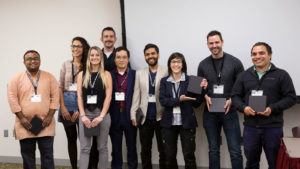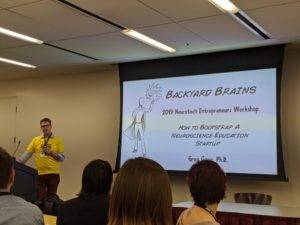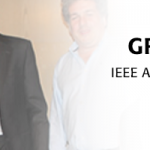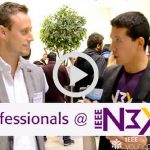TOP STUDENTS PUT HEADS TOGETHER AT ASU NEUROTECH WORKSHOP
Arizona State University hosted the first IEEE Brain Neurotech Entrepreneurs Workshop on December 13-15 to inspire, empower and connect exceptional graduate students who aspire to be entrepreneurs. The workshop, sponsored by the IEEE Brain Initiative, drew 30 graduate students from seven countries for its first class of participants. Selected through a highly competitive application process that drew more than 100 interested students, the participants joined the workshop to develop entrepreneurial techniques that would help them be successful in their futures.
IEEE Brain seeks to facilitate collaboration and coordination across disciplines to advance neuroscience technology research, standardization, and development to improve the human condition. Read the full program here.
HANDS-ON LEARNING BUILDS SKILLS
The student participants were selected from a wide range of backgrounds and experience levels, and each brought their own diverse representation to their teams. Each team of three was randomly assigned a sample product to use for their investor pitches to keep the workshop focused on applying lessons learned.
Not only was the workshop for students, but it was also planned and executed by students.
Student organizers, including Nicholas Hool, designed the pitch competition, developed the products the teams would be given, moderated panel discussions and shared their own experiences as young entrepreneurs.
Simone Rodriguez, an MBA and mechanical engineering student at the University of Pittsburgh, suggested topics for the workshop based on her experience in business school. These topics included the commercialization of research, funding opportunities, and business development.
Students also met with mentors who represented a range of professions, including researchers, startup founders, nanotechnology industry executives, governmental employees, and investors. Together, they discussed topics from stakeholder analysis and value proposition to ethics and pitching.
The three-day experience culminated with the development of a funding pitch a panel of judges. The teams were scored on the execution of their product value proposition, stakeholder analysis, market opportunity, competitive analysis advantage, go-to-market strategy, ethical considerations, and presentation skills.
First place went to Jesus Cruz-Garza, University of Houston, Sharena Rice, University of Michigan, Yannick Roy, Université de Montréal, for their product pitch of a gaming system that utilizes eye-tracking computational methods for dyslexia rehabilitation.
ASU student Justin Tanner and his teammates Florencia Garro, Universidad Nacional de Córdoba, and Siddharth Nair, Indian Institute of Science, Bangalore, earned second place. Together they worked on a pitch for intracranial implants designed to relieve episodes for people with epilepsy.
In third place were Kai Yu, University of Minnesota, Noelle Jacobsen, University of Florida, and Kramay Patel, University of Toronto, who developed a pitch around neurostimulation technology for people with mental illnesses.
Each team was given feedback from the judges on what real investors would have liked and what might discourage investors from funding a product. Read More.

From left to right: Siddharth Nair, Indian Institute of Science, Bangalore, second place; Florencia Garro, Universidad Nacional de Córdoba, second place; Noelle Jacobsen, University of Florida, third place; Justin Tanner, Arizona State University, second place; Kai Yu, University of Minnesota, third place; Kramay Patel, University of Toronto, third place; Sharena Rice, University of Michigan, first place; Yannick Roy, Université de Montréal, first place; Jesus Cruz-Garza, University of Houston, first place. Photographer: Erika Gronek/ASU







